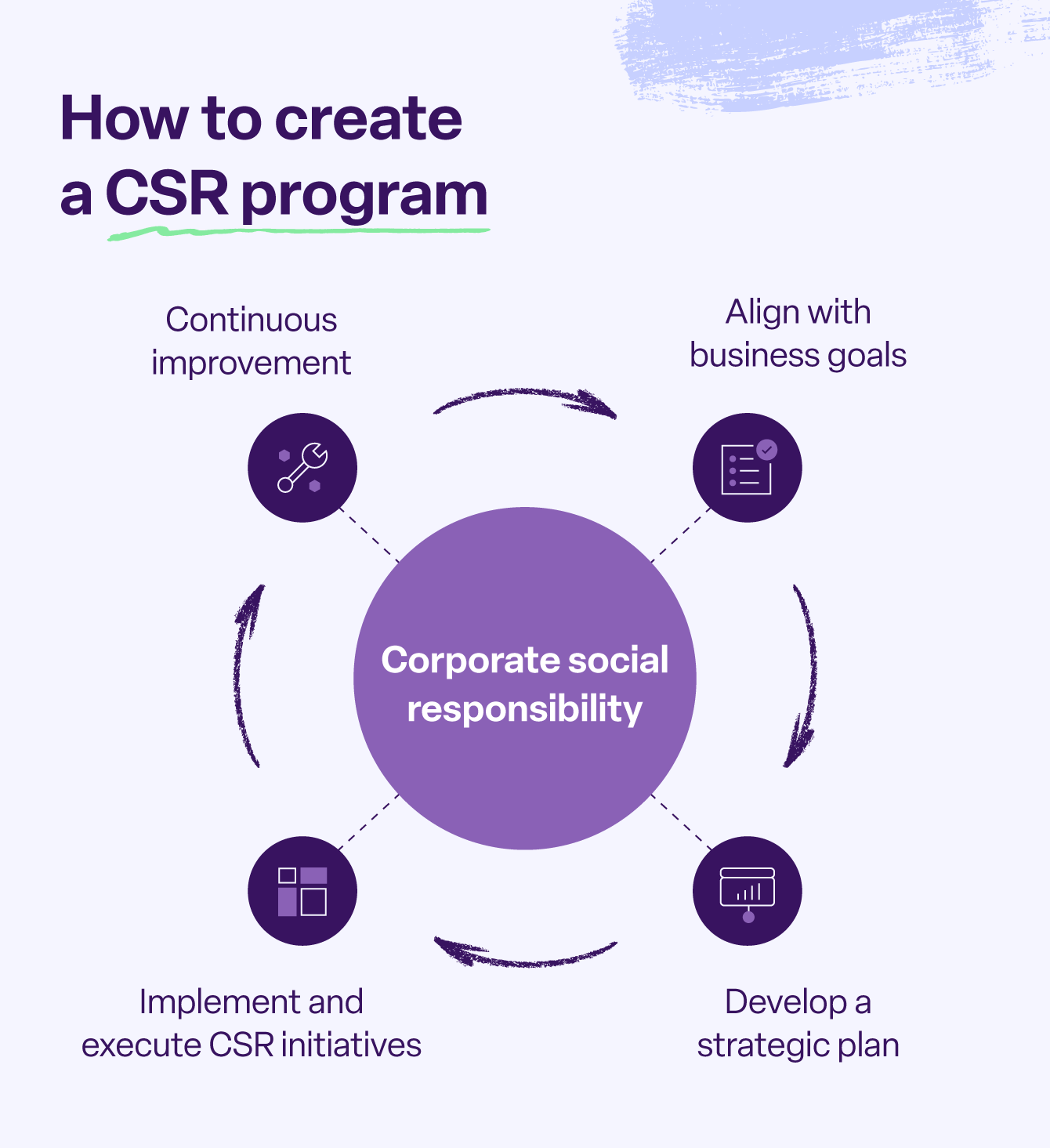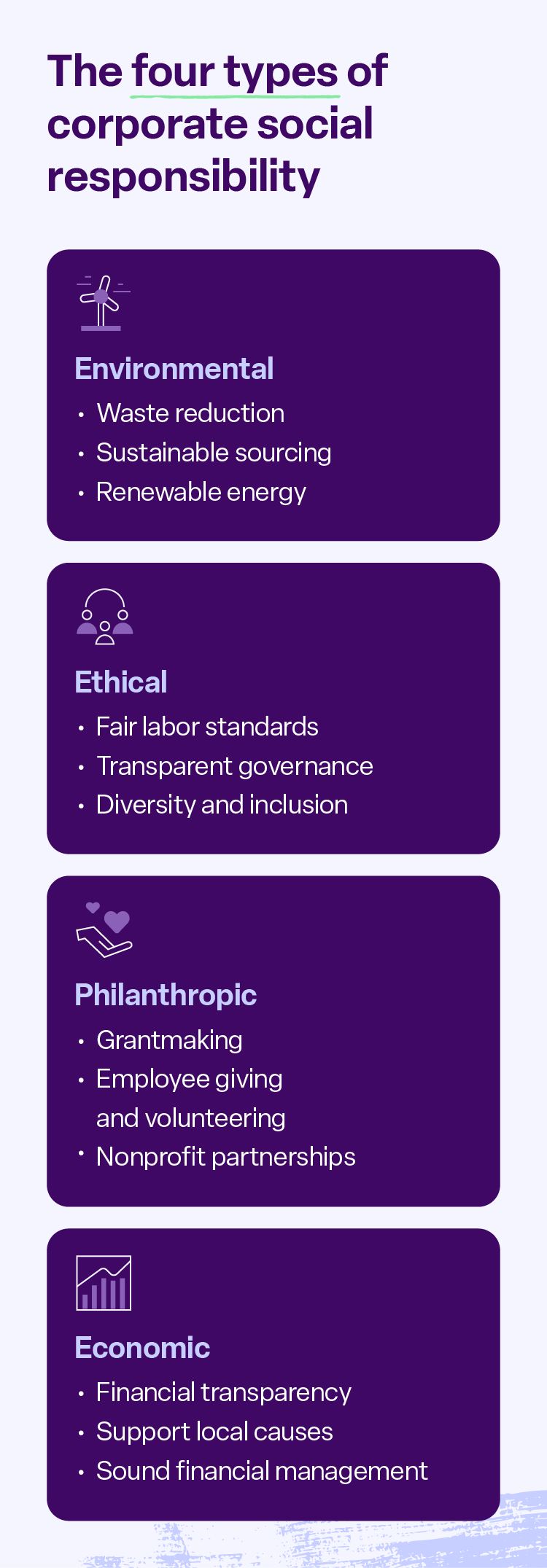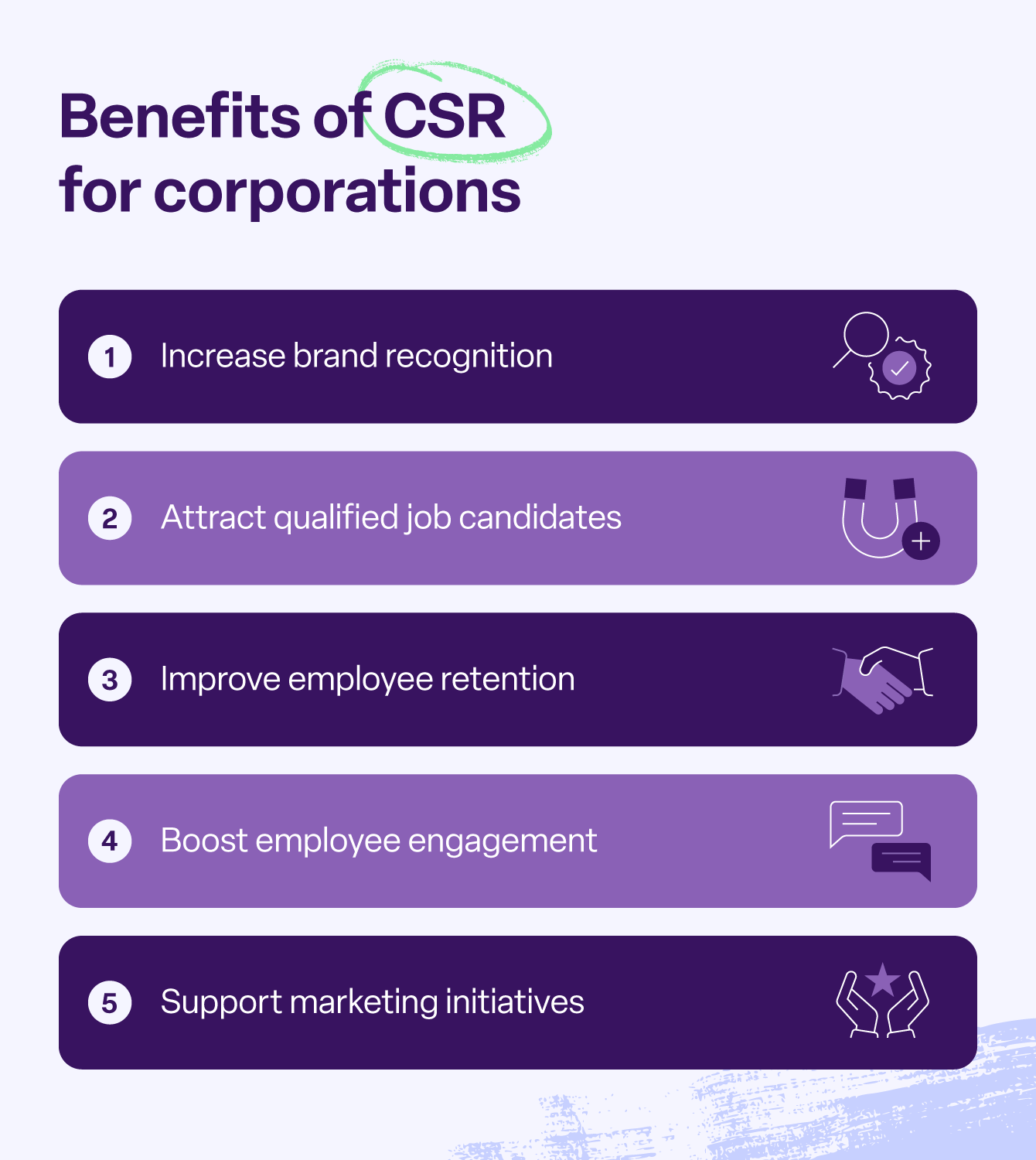The 4 types of corporate social responsibility (and their benefits)

Key takeaways:
The four types of CSR are environmental, economic, philanthropic, and ethical.
Corporate social responsibility is a commitment by businesses to operate in an ethical, sustainable, and responsible manner.
The key benefits of an effective CSR program include brand recognition, attracting qualified candidates, and increasing employee retention and engagement.
Corporate social responsibility (CSR) isn’t just a trend — it’s a competitive edge. According to CSR statistics, 65% of people seek socially conscious employers, a strong CSR program attracts top talent and resonates with customers by aligning with their values.
We’ve put together a guide on the four types of corporate social responsibility to help you establish or improve your CSR strategy.
What is corporate social responsibility (CSR)?
Understanding what CSR is in business is crucial for navigating competitive markets. Corporate social responsibility is a strategy for positively impacting society through company-wide philanthropic efforts.
This strategic approach starts at the executive level but requires company-wide effort to succeed. Corporations create this impact in four different ways, depending on their goals and resources.

4 types of corporate social responsibility
Corporate social responsibility is a wide spectrum of initiatives, often categorized into four distinct types. Businesses can use these categories to strategically develop CSR goals that align with their unique mission and core values.

1. Environmental responsibility
Similar to Environmental, Social, and Governance (ESG), this type of CSR focuses on initiatives that minimize your company’s environmental impact, as well as positive contributions like planting trees or hosting trash cleanups.
Environmental responsibility covers a wide range of actions, including:
- Waste reduction programs: Reduce the amount of waste your company generates by focusing on recycling, composting, and limiting single-use items.
- Sustainable material sourcing: Sourcing materials from businesses that prioritize ethical and sustainable practices.
- Renewable energy initiatives: Reducing your usage of fossil fuels and transitioning your energy usage to renewable sources like solar, wind, and hydropower.
Implementing initiatives like these positively impacts the environment and bolsters your brand’s reputation for eco-friendly practices.
2. Economic responsibility
Economic responsibility is the practice of tying a business’s financial decisions to social good. It is about balancing responsible financial management and financial support for causes that positively impact society.
Examples of this include:
- Transparent reporting: Transparency is a key aspect of economic responsibility — consumers want to know where their money is going and how it is used.
- Investing in the local community: Give back to the communities that support your business by donating to local charities or funding community projects.
- Responsible financial management: Develop financial plans that establish trust in the long-term viability of your business through responsible growth.
3. Philanthropic responsibility
Philanthropic responsibility relates to how businesses give back to local communities or society as a whole. The best CSR programs connect to your company’s core values, align with employee interests, and support the needs of your nonprofit partners.
Some examples of this in action are:
- Charitable giving: Donating to nonprofit organizations that align with your mission and values or match employee donations.
- Volunteering: Providing volunteer time off (VTO), implementing a Dollars for Doers program, or organizing companywide volunteer initiatives.
- Partnering with nonprofits: Establishing long-term nonprofit relationships and working to amplify their message and provide additional fundraising opportunities.
4. Ethical responsibility
Ethical responsibility means running your corporation in an honest and accountable manner. It is a focus on transparency with all stakeholders, from investors to customers.
Ethical responsibility is a broad scope, but some examples include:
- Equitable labor standards: Treat your employees fairly by providing safe working conditions and fair wages.
- Diversity and inclusion: Foster a diverse workplace of backgrounds and opinions where everyone is welcomed and empowered.
- Transparent governance: Accountability begins at the executive level by being open and accurate about the company’s finances and future actions.
The importance of an effective CSR strategy
Investing in effective CSR strategies is important because these initiatives are company-wide and take time to implement. Impactful strategies are the difference between creating a goal and creating an impact.
Top benefits of CSR
CSR can have a positive impact on your business by building brand recognition, attracting qualified candidates, and increasing employee retention and engagement.

Grows brand recognition
Effective CSR efforts can positively impact your brand’s image and reputation. High-profile initiatives can garner media attention, which drives positive publicity and associates your company with social good. Consumers who support the same cause will be inclined to support your company as well.
Attracts qualified job candidates
Today’s job market is highly competitive, and it takes a lot to stand out when hiring qualified candidates. One way to attract top talent is by promoting your company’s social goals and values. Professionals like working for corporations that are making a positive impact on society, especially ones that align with their values.
Increases employee engagement & retention
In addition to attracting qualified candidates, CSR programs are a great way to improve employee retention. Employees who feel connected to their company’s purpose will often be more invested in their work. Engaged employees will have increased motivation, focus, and a drive to push measurable results for your brand.
Supports marketing initiatives
CSR initiatives provide compelling stories with the capacity to emotionally resonate with consumers. It can be applied to most marketing collateral, from video ads to monthly newsletters. CSR adds a layer of trust and credibility to your brand, creating positive associations for potential customers.
Corporate social responsibility examples
To illustrate the impact of CSR in action, here are two examples of corporations with highly successful CSR initiatives.
- Allbirds: Sustainability is built into Allbird’s brand. Their shoes consist of sturdy, recyclable materials, and the company committed to becoming carbon neutral with zero emissions by 2030. Every year, they release a sustainability report for transparency around their environmental impact.
- Microsoft: Microsoft is a great example of a corporation with a diverse set of CSR goals. Some of their initiatives include funding local communities’ efforts, reducing water and energy usage, cutting carbon emissions, financially supporting nonprofits, and championing labor rights for their employees.
Grow your corporate social responsibility strategy with purpose-driven software
There are many types of corporate social responsibility, each with a different objective. Learning about them helps you maximize CSR programs that align with your company’s values and goals.
Finding the right corporate social responsibility software is essential for running effective CSR programs. These tools significantly streamline operations, improve efficiency, and enhance the overall impact of your initiatives.
FAQ
What are the four categories of social responsibility?
The four categories of social responsibility include environmental, economic, philanthropic, and ethical. While they have different goals, each follows the same CSR principles.
How do businesses demonstrate social responsibility?
Businesses demonstrate social responsibility by creating goals and initiatives that support one of the four CSR categories. For example, they could focus on environmental sustainability, employee well-being, or donating to nonprofits with similar values.
What are the three 3 basic principles of CSR?
The basic principles of CSR are environmental, social, and economic responsibility. Some CSR programs blend these together, but every program should focus on at least one.
What is philanthropic responsibility?
Philanthropic responsibility is a corporation’s commitment to improving society by giving back. This could be through monetary donations, volunteering, or amplifying the voice of nonprofit organizations.
Work with Bonterra



